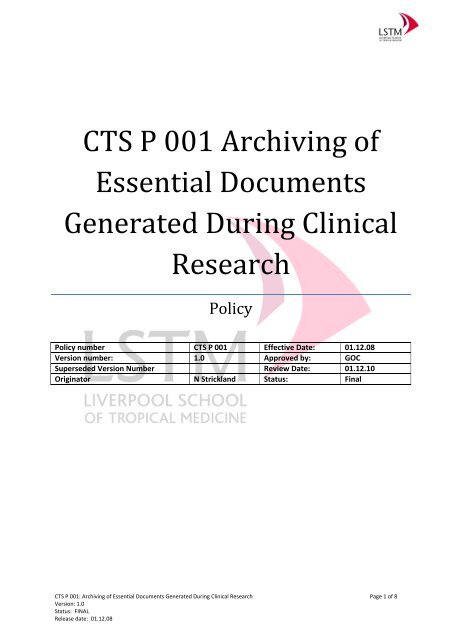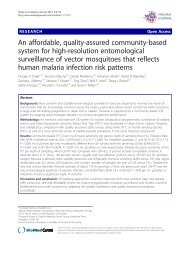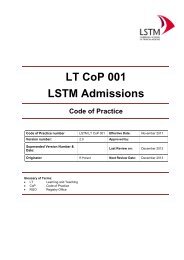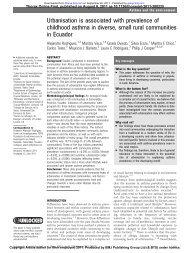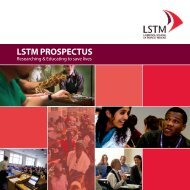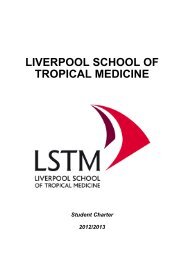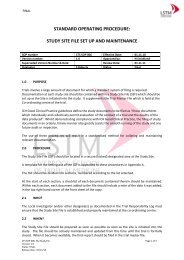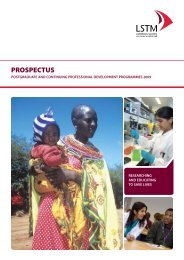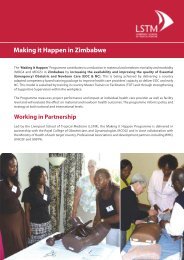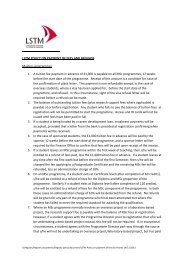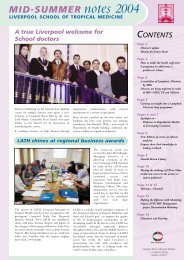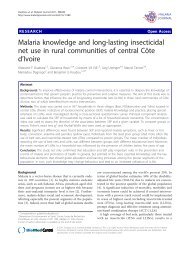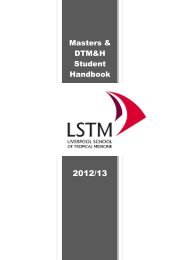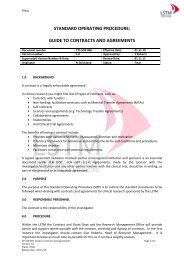CTS P 001 Archiving of Essential Documents Generated During ...
CTS P 001 Archiving of Essential Documents Generated During ...
CTS P 001 Archiving of Essential Documents Generated During ...
You also want an ePaper? Increase the reach of your titles
YUMPU automatically turns print PDFs into web optimized ePapers that Google loves.
Contents1. Background ..................................................................................................................................... 32. Categories <strong>of</strong> Research ................................................................................................................... 32.1 IMP studies ................................................................................................................... 32.2 Trials involving medical devices or a form <strong>of</strong> invention (exposure to above standardlevels <strong>of</strong> radiation or a surgical procedure): ............................................................................... 42.3 Non-interventional research .......................................................................................... 43. Standards ........................................................................................................................................ 43.1 Confidentiality & Security .............................................................................................. 43.2 Record Keeping ............................................................................................................. 53.3 Environmental Conditions ............................................................................................. 53.4 Electronic <strong>Documents</strong> .................................................................................................... 54. Sponsor Master Files ...................................................................................................................... 54.1 Prior to Project Authorisation ........................................................................................ 54.2 Following Project Authorisation (Active Research) ......................................................... 64.3 Following notification <strong>of</strong> the end <strong>of</strong> a study ................................................................... 64.4 Master files for trials <strong>of</strong> IMPs, devices and surgical interventions ................................... 64.5 Master files for non-interventional studies .................................................................... 65. Investigator Site Files ..................................................................................................................... 65.1 Prior to commencing research ....................................................................................... 65.2 <strong>During</strong> the course <strong>of</strong> research ........................................................................................ 65.3 Following the end <strong>of</strong> research ........................................................................................ 76. Duration <strong>of</strong> <strong>Archiving</strong> <strong>Essential</strong> Documentation <strong>Generated</strong> <strong>During</strong> Clinical Research ................ 77. Destruction <strong>of</strong> <strong>Essential</strong> Documentation <strong>Generated</strong> <strong>During</strong> Clinical Research ........................... 78. Glossary .......................................................................................................................................... 7<strong>CTS</strong> P <strong>001</strong>: <strong>Archiving</strong> <strong>of</strong> <strong>Essential</strong> <strong>Documents</strong> <strong>Generated</strong> <strong>During</strong> Clinical Research Page 2 <strong>of</strong> 8Version: 1.0Status: FINALRelease date: 01.12.08
<strong>Archiving</strong> <strong>of</strong> <strong>Essential</strong> Documentation <strong>Generated</strong> <strong>During</strong> Clinical ResearchThis policy has been produced in accordance with ICH-GCP guidelines, The Medicines for Human Use (ClinicalTrials) Amendment Regulations 2006 sections 18 and 28, Commission Directive 2003/63/EC (brought into UKlaw by inclusion in The Medicines for Human Use Regulations 2003 and the Data Protection Act 1998).This policy outlines the LSTM policy for archiving the essential documentation generated during the course <strong>of</strong>clinical research sponsored by the LSTM and covers all interventional research (research involvinginvestigational medicinal products, investigational devices, surgical intervention or exposure to radiation overand above that which is standard clinical practice) as well as non-interventional research.Definition<strong>Archiving</strong> in the context <strong>of</strong> clinical research relates to the collection for long term storage <strong>of</strong> essentialdocuments that individually and collectively permit the evaluation <strong>of</strong> the conduct <strong>of</strong> a trial and the quality <strong>of</strong>the data produced. Section 8 <strong>of</strong> ICH-GCP lists those documents which are considered to be essentialdocuments.1. BackgroundAs the Sponsor for clinical research involving investigational medical products (IMPs), investigational devices,surgical intervention and varied non-interventional clinical research, LSTM has a responsibility to ensure thatall essential documents generated during the course <strong>of</strong> research are archived in accordance with the standard<strong>of</strong> Good Clinical Practice and all applicable Regulations.<strong>Archiving</strong> applies to both the Investigator sites and the Central Trial Coordinating Office. For trials that takeplace overseas which are sponsored by LSTM, a Central Trial Coordinating Centre will <strong>of</strong>ten be established inthe same country as the trial. In these cases the essential documents will be kept in the country <strong>of</strong> origin andnot returned to the Sponsor at the end <strong>of</strong> the trial.<strong>Archiving</strong> is not expected to be the sole responsibility <strong>of</strong> the Investigator. ICH GCP Guidelines state the‘Sponsor should inform the Investigator(s)/Institution(s) in writing <strong>of</strong> the need for record retention and shouldnotify the Investigator(s)/Institution(s) in writing when the trial related records are no longer needed’. It is theresponsibility <strong>of</strong> the Sponsor to inform the Investigator(s)/Institution(s) when documents can be destroyed.This document is for Principal Investigators (PI), research teams and staff in departments which supportresearch activity.2. Categories <strong>of</strong> Research2.1 IMP studiesWith respect to IMP studies, the Medicines for Human Use (Clinical Trials) Amendment Regulations 2006require that:(1) The Sponsor shall keep a trial master file for a clinical trial.(2) The Sponsor shall ensure that the trial master file is readily available at all reasonable times for inspectionby the licensing authority or any person appointed by the Sponsor to audit the arrangements for the trial.(3) The master file shall at all times contain the essential documents relating to that clinical trial.(4) The essential documents relating to a clinical trial are those which—(a) enable both the conduct <strong>of</strong> the clinical trial and the quality <strong>of</strong> the data produced to be evaluated; and (b)show whether the trial is, or has been, conducted in accordance with the applicable requirements <strong>of</strong> Directive2<strong>001</strong>/83/EC, the Directive, the GCP Directive and Commission Directive 2003/94/EC.<strong>CTS</strong> P <strong>001</strong>: <strong>Archiving</strong> <strong>of</strong> <strong>Essential</strong> <strong>Documents</strong> <strong>Generated</strong> <strong>During</strong> Clinical Research Page 3 <strong>of</strong> 8Version: 1.0Status: FINALRelease date: 01.12.08
(5) The essential documents shall contain information specific to each phase <strong>of</strong> the trial.(6) The Sponsor shall ensure that any alteration to a document contained, or which has been contained, in thetrial master file shall be traceable.(7) The Sponsor and the Chief Investigator shall ensure that the documents contained, or which have beencontained, in the trial master file are retained for at least 5 years after the conclusion <strong>of</strong> the trial and thatduring that period are(a) readily available to the licensing authority on request; and (b) complete and legible.(8) The Sponsor and Chief Investigator shall ensure that the medical files <strong>of</strong> trial subjects are retained for atleast 5 years after the conclusion <strong>of</strong> the trial.(9) The Sponsor shall appoint named individuals within his organisation to be responsible for archiving thedocuments which are, or have been, contained in the trial master file and, subject to paragraph (2), access tothose documents shall be restricted to those appointed individuals.(10) If there is transfer <strong>of</strong> ownership <strong>of</strong> data or documents connected with the clinical trial(a) the Sponsor shall record the transfer; and (b) the new owner shall be responsible for data retention andarchiving in accordance with paragraphs (2), (7) and (8).For LSTM sponsored IMP studies, essential documentation will be retained for a period <strong>of</strong> at least 5 years.Where studies are externally sponsored, the external sponsor (commercial or non-commercial) will advise theInvestigator as to how documentation should be stored and for how long. The requirements <strong>of</strong> the externalsponsor must be detailed in the contractual agreements at the start <strong>of</strong> the trial.2.2 Trials involving medical devices or a form <strong>of</strong> invention (exposure to above standard levels <strong>of</strong>radiation or a surgical procedure):Where medical device/interventional studies are sponsored by LSTM, the same principles as for LSTMsponsored IMP studies will apply.Where studies are externally sponsored, the external sponsor (commercial or non-commercial) will advise theInvestigator as to how documentation should be stored and for how long. The requirements <strong>of</strong> the externalsponsor must be detailed in the contractual agreements at the start <strong>of</strong> the trial.2.3 Non-interventional researchWhere non-interventional studies are sponsored by LSTM, documents should be retained for a period <strong>of</strong> atleast 5 years after the closure <strong>of</strong> the trial. Five years is also likely to be the period <strong>of</strong> document retentionadvised by external Sponsors <strong>of</strong> non-interventional research however it is possible that external Sponsors mayrequire an archiving period <strong>of</strong> longer than 5 years. This should be detailed in the contractual agreement.3. StandardsThe following guidance, which reflects the requirements <strong>of</strong> the UK Medicines for Human Use (Clinical Trials)Amendment Regulations 2006 and is taken from guidelines prepared by the European Forum for Good ClinicalPractice, is to be used to gauge the suitability <strong>of</strong> an archiving facility in Sponsor/Investigator site premises.3.1 Confidentiality & SecuritySecure filing space should be available for the storage <strong>of</strong> Investigator Site Files during the conduct <strong>of</strong> theclinical trial. Investigator Site Files will normally be stored in an Investigator’s <strong>of</strong>fice or local filing area. At theend <strong>of</strong> the trial the files must be transferred to a centralised archiving facility if the Investigator has access to<strong>CTS</strong> P <strong>001</strong>: <strong>Archiving</strong> <strong>of</strong> <strong>Essential</strong> <strong>Documents</strong> <strong>Generated</strong> <strong>During</strong> Clinical Research Page 4 <strong>of</strong> 8Version: 1.0Status: FINALRelease date: 01.12.08
one or transferred <strong>of</strong>f premises to a dedicated <strong>of</strong>f-site archiving facility. Prompt retrieval <strong>of</strong> essentialdocumentation is essential. Access to the archive facility should be restricted and documented. An individualshould be made responsible for the archive.3.2 Record KeepingInvestigators must ensure that data are recorded and stored correctly and accurately. This not only includesdata recorded on Case Report Forms but also all original source data (for example patient medical notes,laboratory test results, radiological images) and pharmacy data (drug dispensing records and drugaccountability records for example).3.3 Environmental ConditionsThe minimum requirement is for documentation to be stored in conditions that minimise the risk <strong>of</strong> damage toor loss <strong>of</strong> information. The risk <strong>of</strong> damage from water should be reduced by storing documentation above floorlevel and away from overhead water pipes. Documentation should be located in areas with minimal variationin temperature and humidity if stored for long periods <strong>of</strong> time.Plastic wallets, paperclips and staples should be avoided as over time they can damage the paper documentssurrounding them.3.4 Electronic <strong>Documents</strong>Some essential documents may be electronic such as databases or emails. These documents must be handleddifferently and it is not appropriate to just print these <strong>of</strong>f as important information is lost in this process.Electronic documents should be held on a secure server for the duration <strong>of</strong> the archive period.Directive 2005/28/EC states in Article 20 that: “The media used to store essential documents shall be such thatthose documents remain complete and legible throughout the required period <strong>of</strong> retention and can be madeavailable to the competent authorities upon request. Any alteration to records shall be traceable.”Particular attention should be paid when records are stored on electronic, magnetic, optical, or other nonindeliblemedia. In such cases suitable controls should be implemented to ensure that these records cannot bealtered without appropriate authorization and the creation <strong>of</strong> an audit trail.When original records are transferred to other media, for the purpose <strong>of</strong> archiving, the system <strong>of</strong> transfershould be validated to ensure that information will not be lost or altered. Such transfers should be certified foraccuracy and completeness by someone with appropriate authority (e.g. trial manager), as part <strong>of</strong> the qualityassurance system.For media that require processing in order to render records into a readable format, the availability <strong>of</strong>appropriate equipment should be ensured so that this processing can be done.4. Sponsor Master FilesThe Central Trial Coordinating Office should archive and destroy the Sponsor Master Files which it hasproduced for each research project in line with the timelines observed by the Investigator for the archiving anddestruction <strong>of</strong> Investigator Site Files as determined by the study Sponsor (see Section 6).4.1 Prior to Project AuthorisationSponsor Master Files for all categories <strong>of</strong> research will be kept in the Central Trial Coordinating Centre fromthe point <strong>of</strong> project registration until authorisation to commence the study has been granted.<strong>CTS</strong> P <strong>001</strong>: <strong>Archiving</strong> <strong>of</strong> <strong>Essential</strong> <strong>Documents</strong> <strong>Generated</strong> <strong>During</strong> Clinical Research Page 5 <strong>of</strong> 8Version: 1.0Status: FINALRelease date: 01.12.08
4.2 Following Project Authorisation (Active Research)Following authorisation, Sponsor Master Files will continue to be kept in the Central Trial Coordinating Centrein an area designated for active research and will remain there for the duration <strong>of</strong> active research.4.3 Following notification <strong>of</strong> the end <strong>of</strong> a studyOnce the Central Trial Coordinating Centre has been notified that a study has finished and is due to bearchived, the Sponsor Master File will be moved to archive. This may be on site or at an approved <strong>of</strong>f-sitefacility.4.4 Master files for trials <strong>of</strong> IMPs, devices and surgical interventionsMaster files for trials <strong>of</strong> IMPs, devices and surgical interventions will be kept by the Central Trial CoordinatingCentre for a period <strong>of</strong> at least 5 years following the end <strong>of</strong> a study unless otherwise advised by the Sponsor <strong>of</strong>the research (if not sponsored by LSTM).4.5 Master files for non-interventional studiesMaster files for non-interventional studies will be kept by the Central Trial Coordinating Centre for a period <strong>of</strong>at least 5 years following the end <strong>of</strong> a study unless otherwise advised by the Sponsor <strong>of</strong> the research (if notsponsored by LSTM).5. Investigator Site FilesIt is the responsibility <strong>of</strong> the Principal Investigator to archive all essential documentation and ensure that thesedocuments are stored in a manner which ensures that they are not lost, damaged or prematurely destroyed.For all new studies registered with the LSTM Research Management Office following the implementation <strong>of</strong>this Policy, Investigators will be required to address archiving arrangements when preparing their submissionfor LSTM approval. Research will not be authorised to commence without clarification from Investigators <strong>of</strong>planned archiving arrangements. Costs to cover archiving must be built into any grant applications and forcommercial studies the Investigator should negotiate the cost <strong>of</strong> archiving with the commercial Sponsor.5.1 Prior to commencing researchPlans for archiving trial documents should be made in the design phase <strong>of</strong> a trial and costs <strong>of</strong> storage should beconsidered. Adequate and suitable space should be provided for the secure storage <strong>of</strong> all essential records notonly during the course <strong>of</strong> a study but also for the immediate post completion phase <strong>of</strong> a study and for longterm storage.All essential documents should be maintained following the standards detailed in Section 3 <strong>of</strong> this policy.Investigators have the following options for archiving essential documentation:To store documentation locally if suitable archiving facilities are available.To store <strong>of</strong>f-site in a dedicated archiving facility.5.2 <strong>During</strong> the course <strong>of</strong> research<strong>During</strong> the course <strong>of</strong> the study the Investigator must ensure that access to the Investigator Site Files isrestricted to authorised personnel.Prompt retrieval <strong>of</strong> essential documentation is important and therefore the location <strong>of</strong> Investigator Site Filesmust be documented and made known to all members <strong>of</strong> the research team.<strong>CTS</strong> P <strong>001</strong>: <strong>Archiving</strong> <strong>of</strong> <strong>Essential</strong> <strong>Documents</strong> <strong>Generated</strong> <strong>During</strong> Clinical Research Page 6 <strong>of</strong> 8Version: 1.0Status: FINALRelease date: 01.12.08
Any change in the ownership and location <strong>of</strong> the documentation should be documented in order to allowtracking <strong>of</strong> the stored records.5.3 Following the end <strong>of</strong> researchThe Investigator must maintain an archive index/log to record all essential documents that have been enteredinto the archive, and to track and retrieve any documents on loan from the archive.The Investigator should make the Sponsor <strong>of</strong> the trial aware <strong>of</strong> the storage arrangements for the documents tobe stored at Investigator sites. If the Investigator becomes unable to store their essential documents, theSponsor should be notified in writing so that alternative storage arrangements can be agreed.If the Investigator is no longer able to maintain custody <strong>of</strong> their essential documents, the Sponsor should benotified in writing <strong>of</strong> the arrangements that have been made in line with the requirements <strong>of</strong> the applicableRegulations. Changes in personnel must be defined in the Study File and handover <strong>of</strong> responsibilitydocumented.The Investigator should complete an archiving record and return this to the Research Management Office,LSTM.The Investigator should meet the costs <strong>of</strong> archiving.6. Duration <strong>of</strong> <strong>Archiving</strong> <strong>Essential</strong> Documentation <strong>Generated</strong> <strong>During</strong> Clinical ResearchThe Medicines for Human Use (Clinical Trials) Amendment Regulations 2006 state “The Sponsor and ChiefInvestigator shall ensure that the medical files <strong>of</strong> trial subjects are retained for at least 5 years after theconclusion <strong>of</strong> the trial”.All essential documents generated during LSTM sponsored clinical research should be archived for at least 5years following the end <strong>of</strong> the trial.If data obtained during the course <strong>of</strong> an IMP trial is to be used for licensing purposes, the trial documentationmust also be archived for a period <strong>of</strong> 2 years after the last marketing approval or 2 years after discontinuation<strong>of</strong> development.External Sponsors may dictate a different archiving period in the contractual agreement; this must beobserved by the Investigator.7. Destruction <strong>of</strong> <strong>Essential</strong> Documentation <strong>Generated</strong> <strong>During</strong> Clinical ResearchICH/GCP Guidelines state that it is the Sponsor’s responsibility to inform the Investigator when the documentscan be destroyed.The Data Protection Act 1998 (DPA) – schedule 1, Part 1, Principal 5: Personal data processed for any purposeor purposes shall not be kept for longer than is necessary for that purpose or those purposes.For trials Sponsored by the LSTM, the Research Management Office will inform the Investigator that thedocuments for a particular trial should be destroyed.Destruction must be documented and a certificate <strong>of</strong> destruction held by the Investigator (copy sent to LSTMResearch Management Office) for a further 5 years.8. GlossaryChief Investigator (CI):<strong>CTS</strong> P <strong>001</strong>: <strong>Archiving</strong> <strong>of</strong> <strong>Essential</strong> <strong>Documents</strong> <strong>Generated</strong> <strong>During</strong> Clinical Research Page 7 <strong>of</strong> 8Version: 1.0Status: FINALRelease date: 01.12.08
(a) in relation to a clinical trial conducted at a single trial site, the Investigator for that site(b) in relation to a clinical trial conducted at more than one trial site, the authorised health care pr<strong>of</strong>essional,whether or not he is an Investigator at any particular site, who takes primary responsibility for the conduct <strong>of</strong>the trialCentral Trial Coordinating Office:The <strong>of</strong>fice that coordinates the trial(s) conducted over several trial sites and is based in the same country asthe trial.End <strong>of</strong> trial (for archiving):The day the trial database is locked down.GCP:Good Clinical PracticeICH:International Conference on HarmonisationIMP:Investigational Medicinal ProductInvestigator Site Files:The essential trial documents that during the trial are kept at individual trial sitesPrincipal Investigator (PI):The principal Investigator at a trial siteSponsor:Individual/organisation responsible for the initiation, management/financing <strong>of</strong> a clinical trialSponsor Master File:The essential trial documents that during the trial are kept at the Central Trial Coordinating CentreTrial Master Files:The essential trial documents listed in section 8 ICH GCP<strong>CTS</strong> P <strong>001</strong>: <strong>Archiving</strong> <strong>of</strong> <strong>Essential</strong> <strong>Documents</strong> <strong>Generated</strong> <strong>During</strong> Clinical Research Page 8 <strong>of</strong> 8Version: 1.0Status: FINALRelease date: 01.12.08


